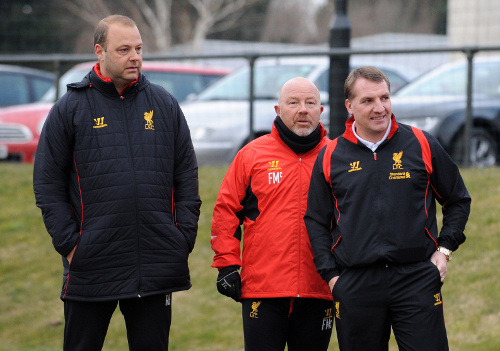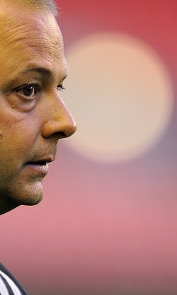Rodolfo: My pride at U13s' Japan visit
Last week, Liverpool's U13s squad embarked on a trip to the other side of the world to take part in a tournament in Japan – and in this week's Academy column, Rodolfo Borrell reflects on a truly memorable trip.
One of the most instantly-recognisable faces at the club's Kirkby complex, Rodolfo has been at the heart of Liverpool's youth development since 2009.
And in his first column of the new season, the Spaniard talks enthusiastically about the visit to Tokyo and how he'll be working hard to secure similar trips in the future...
Last week we took up the fantastic opportunity to attend a tournament in Japan with our U13s - and as soon as this competition came to my attention, I knew that it was going to be a great opportunity for the lads.
The squad we took was a mixture of U12 and U13 players, and our primary aim was for them to experience other cultures as well as face different styles of football.
The tournament was organised after Barcelona signed a Japanese U13 player. This was a massive event in Japan. So they decided to create a tournament, the very first edition, where all the best U13 sides that belong to Premiership clubs in the country, plus some teams from around the world, went head-to-head.
The competition was called 1st World Challenge, and I first heard about it when Barcelona's director of football contacted me and asked if we would be interested in taking part in the tournament. Very quickly, alongside academy director Frank McParland, we decided that it was something we had to do.
Put simply, our boys were fantastic over there. I don't say things that I don't feel, and I can honestly tell you that this trip and the way the young lads were was very impressive.
We were playing under really difficult conditions, with temperatures of 30 degrees most of the time. Our lads were also playing in 60-70 per cent humidity during each of the games, which makes it extremely difficult to perform, especially for young boys coming over from England.
The Japanese, as well as the Spanish and other teams, were used to the heat, but for our boys it was an incredible effort.
We had no problems at all. The first two days, a couple of lads were a little bit homesick, but we managed to sort that out by getting them on the phone and getting them to call their parents constantly.
Jan Pizzey, the academy secretary, and Ian Barrigan, head of local recruitment, were a huge help in that respect too. Each of the lads conducted themselves very well - and they supported each other.
It was a huge experience, not only from the football point of view, but from a personal point of view for them at such a young age. When I was an U13 player, it would have been almost impossible to go out and play in a tournament like this in Japan.
In the past, when I was at FC Barcelona, the club and I tried to have all the teams travel constantly, all around the world, and this is one of the targets that I have right now. I've got the backing of Frank McParland as academy director, from the assistant academy manager Phil Roscoe and most importantly from the manager Brendan Rodgers.

All of these people look at travelling to new countries to play football as a positive thing and I'm working really hard to get a lot more of these sorts of trips in place, especially for our younger age groups.
Why? Because usually the U21s and U18s get a lot more experience of this type of travel, but for the young ones, I think it's something they can benefit from too - and their development is pushed forward a lot by these type of events.
The main coach for the U13s was unable to join us on the trip to Japan, so Dave Rowe came along as he is the assistant coach for the U13s. Stephen Torpey also came with us. He's a good young coach, who is eager to improve and currently works with the U11s. Stephen knew all the lads because some of them were coming through last season with the U11s.
Tokyo and the surrounding areas have about 27 million people, so you can imagine how big the place is. It meant that we had more than an hour-and-a-half's travel to the event from our hotel. This meant at least three hours a day on a coach going back and forth.
Also, our games were held very early in the morning, and because there was no time to come back after the first match, we had to wait at the event for quite some time before we played the second game of the day. So it meant that, in total, we were out for about 10 hours each day - two hours playing and eight hours travelling and waiting.
This means you need to know how to manage the lads, entertain them and look after them. I'll be honest, it was exhausting! But everything was for the benefit of our players and so it was well worth it.
On the pitch, I was delighted with the football we played. I wasn't expecting such a high level, considering the weather and everything else I have spoken about already. The boys performed twice a day, four days in a row and played a total of eight games.
They went all the way through to the final, wining all seven matches on the way. But the most important thing was not the winning; it was seeing how they were beating their opponents, by playing the way we want them to.
Our young lads built their play from the back, keeping their discipline, focus and consistency at the same time. They were keeping the ball, and moving it the way we want them to.
If you do all that and win the games, like we did, then fantastic. But if not, the most important thing is the performance - and they did fantastically well.
In the final we lost to Barcelona. It was nice for me to see some old friends, but I've been here for four years and I belong to Liverpool Football Club. I'm not too fussed about playing against my old side, or against the likes of Real Madrid - I just try to defend the interests of our football club.

One of the main targets with these trips is for the lads to realise about the other cultures that exist around the world, where the mentality and the way of living is completely different to ours.
We arrived in Tokyo, very exhausted after more than 20 hours travelling, and we decided that we were going to go and visit a few places, like Shibuya, as we wanted the lads to keep awake until the night for them and ourselves to adapt as soon as possible to the new schedule and the eight hour difference.
On the second day, after the official opening presentation, we asked the organisers if we could see something of Japan - and so we went to the Imperial Palace. It's only possible to visit the gardens there, because the Imperial Family are living there. Later on we visited Senso-Ji, one of the most famous temples in Japan, which the lads also clearly enjoyed very much.
Overall, it was a superb trip. In the beginning, you have to take many things into account - the lads' ages, the distance and the staff too.
Ian Barrigan, who is head of local recruitment at our Academy, alongside Jan Pizzey, the Academy secretary, know a lot of the lads' families and they coordinated everything brilliantly with them in terms of schedules ,information and many other things. Neil Davies also joined the trip as a physio-therapist and he made a great contribution to the trip.
Then it was important for us to select people who were professional and who had experience to deal with such a young age group. At the end of the tournament, I can look back and say that everything was fantastic. We've been receiving many emails from the families of our players, who have spoken about the experience their children enjoyed.
We also received an email from the organisers congratulating us for the way the lads behaved and performed during the tournament.
Obviously, this has encouraged me to look for a lot more of these events, because I think it's vital from many different points of view - from development as a player, as a team and as a human being too.



